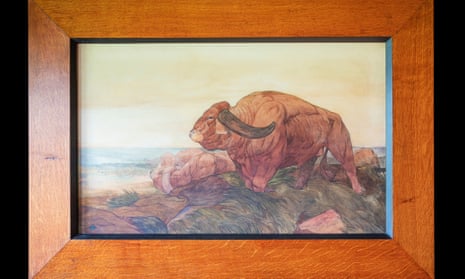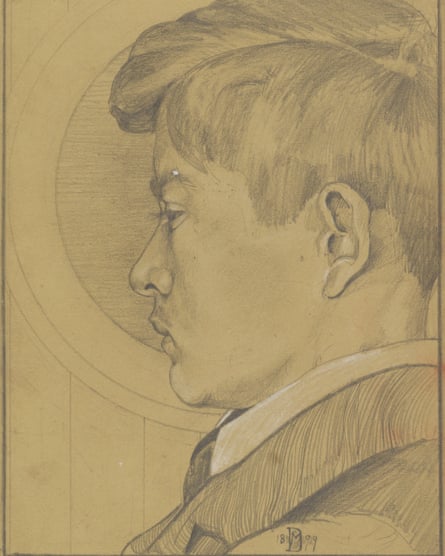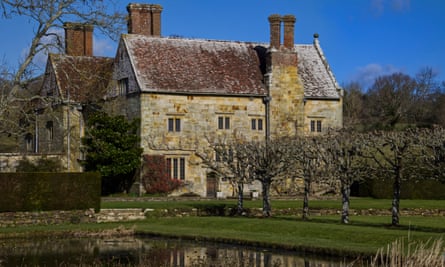The Return of the Buffalo Herd, by teenage prodigies Edward and Charles Detmold, can be seen at Bateman’s after conservation

The Return of the Buffalo Herd (1901), created by Edward Julius Detmold for The Jungle Book, which is now on display at Bateman's, Rudyard Kipling’s country home. Photograph: James Dobson/National Trust Images
Harriet Sherwood
THE GUARDIAN
Harriet Sherwood
THE GUARDIAN
Fri 16 Feb 2024
A rare watercolour depicting the aftermath of a climactic moment in Rudyard Kipling’s The Jungle Book is to go on display at the author’s country home after conservation work.
The painting, The Return of the Buffalo Herd, is one of 16 created by twin brothers Edward and Charles Detmold, who were just 18 when they were commissioned to illustrate Kipling’s much-loved story. Only four of the paintings have survived.
It shows Rama, the great herd bull, staring back at the plain after Mowgli, the story’s protagonist, used a herd of buffalo to trigger a stampede to crush his foe, the murderous tiger Shere Khan.
The dramatic moment was described by Kipling: “The torrent of black horns, foaming muzzles, and staring eyes whirled down the ravine like boulders in flood time … The terrible charge of the buffalo-herd, against which no tiger can hope to stand.” Rama was a creature with “long, backward-sweeping horns and savage eyes”, he wrote.
A rare watercolour depicting the aftermath of a climactic moment in Rudyard Kipling’s The Jungle Book is to go on display at the author’s country home after conservation work.
The painting, The Return of the Buffalo Herd, is one of 16 created by twin brothers Edward and Charles Detmold, who were just 18 when they were commissioned to illustrate Kipling’s much-loved story. Only four of the paintings have survived.
It shows Rama, the great herd bull, staring back at the plain after Mowgli, the story’s protagonist, used a herd of buffalo to trigger a stampede to crush his foe, the murderous tiger Shere Khan.
The dramatic moment was described by Kipling: “The torrent of black horns, foaming muzzles, and staring eyes whirled down the ravine like boulders in flood time … The terrible charge of the buffalo-herd, against which no tiger can hope to stand.” Rama was a creature with “long, backward-sweeping horns and savage eyes”, he wrote.

A drawing of Edward Julius Detmold by his brother Charles Maurice Detmold. Photograph: National Portrait Gallery London
The watercolour is dated 1901 and signed with the monogram “EJD” – Edward Julius Detmold. He and his brother Charles had been creating artworks since their early teens. But, despite professional success, the twins’ personal lives were challenging, and both took their own lives – Charles in 1908 and Edward in 1957.
“Comparisons could be drawn between the Detmold twins and Mowgli, who in the original story of The Jungle Book was a rather troubled character trapped between two worlds,” said Hannah Miles, collections and house manager at Bateman’s, Kipling’s house in Burwash, Sussex, now owned by the National Trust.
“It feels poignant to display their magnificent illustration alongside a copy of the book featuring all of the twins’ original pictures, in the place that meant so much to the story’s author, Rudyard Kipling.”
The watercolour is dated 1901 and signed with the monogram “EJD” – Edward Julius Detmold. He and his brother Charles had been creating artworks since their early teens. But, despite professional success, the twins’ personal lives were challenging, and both took their own lives – Charles in 1908 and Edward in 1957.
“Comparisons could be drawn between the Detmold twins and Mowgli, who in the original story of The Jungle Book was a rather troubled character trapped between two worlds,” said Hannah Miles, collections and house manager at Bateman’s, Kipling’s house in Burwash, Sussex, now owned by the National Trust.
“It feels poignant to display their magnificent illustration alongside a copy of the book featuring all of the twins’ original pictures, in the place that meant so much to the story’s author, Rudyard Kipling.”

View image in fullscreenView of Rudyard Kipling's country house, Bateman's, in Sussex.
Photograph: Laurence Perry/National Trust Images
Two of the four watercolours known to survive are in private collections, and the third is held at the Natural History Museum, said Miles.
“We’re delighted to be able to put The Return of the Buffalo Herd on display at Bateman’s, exactly 130 years after the story was published. It will provide a rare chance for fans to discover and experience the story’s darker origins as it was in Kipling’s day.”
The watercolour has undergone careful conservation by Louise Drover, a specialist conservator, who humidified the work, to peel away the old canvas lining.
“Japanese tissue was used to make small repairs and the tone was evened out through gentle swabbing and minor retouching with pure pigment watercolours and chalks,” she said. “I hope visitors to Bateman’s are as enchanted by the artwork as I was.”
The National Trust said its acquisition of The Return of the Buffalo Herd was made possible thanks to a fund set up by the late philanthropist Simon Sainsbury.
In the UK and Ireland, Samaritans can be contacted on 116 123, or email jo@samaritans.org or jo@samaritans.ie. In the US, the National Suicide Prevention Lifeline is 1-800-273-8255. In Australia, the crisis support service Lifeline is 13 11 14. Other international helplines can be found at befrienders.org.
Two of the four watercolours known to survive are in private collections, and the third is held at the Natural History Museum, said Miles.
“We’re delighted to be able to put The Return of the Buffalo Herd on display at Bateman’s, exactly 130 years after the story was published. It will provide a rare chance for fans to discover and experience the story’s darker origins as it was in Kipling’s day.”
The watercolour has undergone careful conservation by Louise Drover, a specialist conservator, who humidified the work, to peel away the old canvas lining.
“Japanese tissue was used to make small repairs and the tone was evened out through gentle swabbing and minor retouching with pure pigment watercolours and chalks,” she said. “I hope visitors to Bateman’s are as enchanted by the artwork as I was.”
The National Trust said its acquisition of The Return of the Buffalo Herd was made possible thanks to a fund set up by the late philanthropist Simon Sainsbury.
In the UK and Ireland, Samaritans can be contacted on 116 123, or email jo@samaritans.org or jo@samaritans.ie. In the US, the National Suicide Prevention Lifeline is 1-800-273-8255. In Australia, the crisis support service Lifeline is 13 11 14. Other international helplines can be found at befrienders.org.
No comments:
Post a Comment